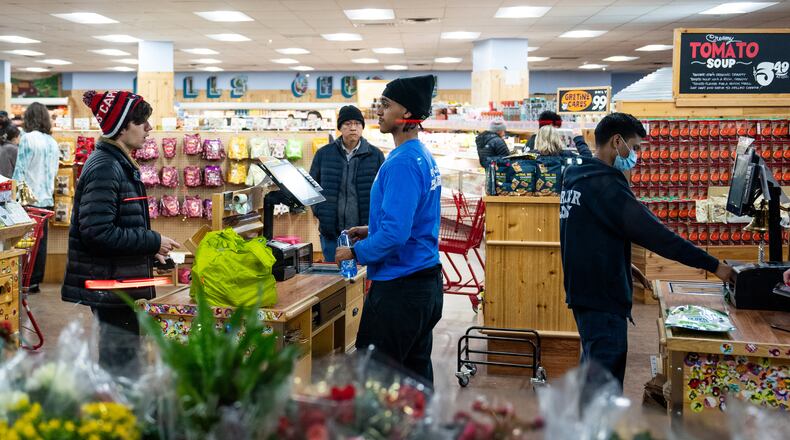Eduardo Baetti called the tariffs announced Wednesday by President Donald Trump a threat to his plan “to live a good life in our last 10 or 15 years” of retirement.
Seated outside an Ansley Mall restaurant at lunchtime Thursday, Baetti, 72, fretted about the hit to the stock market and the broader economy and likely spike in prices. The S&P 500 on Thursday racked up its biggest single-day loss since the COVID-19 shock of March 2020, and economists warned the sweeping import taxes of at least 10% on almost all imported goods, with much higher tariffs on key U.S. trading partners, could scramble the economy and possibly tip the U.S. into recession.
Baetti called the tariffs “total chaos that will trigger grave consequences on the American people.”
“The global economy cannot be denied,” he said.
One of the first places consumers are likely to see the impact of the tariffs is the grocery store. Many fruits, vegetables and pantry staples are imported. Check the labels on clothing, electronics, toys and many common goods consumers buy every day — many of them are imported too.
The so-called reciprocal tariffs are Trump’s widest reaching yet. On Thursday, 25% taxes on imported automobiles and auto parts started.
Federal Reserve Chair Jerome Powell said Friday that the Trump administration’s tariff policies are likely to spur broad economic consequences that will ripple through most facets of the American economy.
“It is now becoming clear that tariff increases will be significantly larger than expected,” Powell told reporters Friday at the Society for Advancing Business Editing and Writing’s annual conference in Arlington, Va. “And the same is likely to be true of (their) economic effects, which will include higher inflation and slower growth. The size and duration of those effects remain uncertain.”
Trump has touted tariffs as a revenue generator for the government, as a stick to reshore manufacturing jobs and encourage foreign investment in the U.S. and as leverage to renegotiate what he considers unfair trade deals. But reshoring takes time and is costly. Other countries, meanwhile, are taking aim with their own countermeasures.
Tariffs of 34% are planned on goods from China and combined with previous levies of 20% brings the Chinese tariff to 54%. Import taxes of 20% for the European Union, 10% for the United Kingdom, 46% for Vietnam, 32% for Taiwan and 24% for Japan will go into effect in the coming days.
“April 2 will forever be remembered as the day American industry was reborn and America’s legacy was reclaimed and the day we made America wealthy again,” Trump said Wednesday.
On Friday, China retaliated with a 34% tariff on imports of U.S. products starting April 10. China is Georgia’s No. 3 export market, behind Canada and Mexico, according to Georgia Department of Economic Development data for 2024.
An analysis by the nonpartisan Tax Foundation found that the average U.S. tariff rate will jump from 2.5% in 2024 to 18.8%, which is the highest average rate since 1933. For American households, the tariffs will amount to a tax increase this year of more than $2,100. An estimate by a conservative group with ties to former Vice President Mike Pence pegged the average cost at $3,500.
The top five import markets for Georgia are Mexico, China, South Korea, Germany and Vietnam, according to the Georgia Department of Economic Development.
Chris Roland, the general manager of the specialty Sevananda Natural Foods Market in Little 5 Points, expects to see price increases across the store.
Fresh produce will be impacted the most, Roland said.
Credit: NYT
Credit: NYT
The National Cooperative Grocers, which serves co-op grocers, expect retail price increases of 15-25% for most fresh fruits and vegetables imported from Mexico and Canada, with high-demand regional fruits like avocados likely to increase 25-35%. Processed and frozen products will also see price spikes, though perhaps not as much.
Dairy and bakery products are expected to be less affected, as producers are more likely to absorb some increased costs.
Another category hit by the tariffs is meat.
Ahead of the tariffs taking effect, the Consumer Brands Association, which represents packaged food makers, urged the Trump administration to exempt key ingredients that need to be imported because of scarce availability domestically. These include coffee, oats and cocoa.
Credit: NYT
Credit: NYT
“Reciprocal tariffs that do not reflect ingredient and input availability concerns will inevitably raise costs, limit consumer access to affordable products and unintentionally harm iconic American manufacturers,” Tom Madrecki, the association’s vice president of supply chain resiliency, said in a statement.
One of Baetti’s friends, Rodolfo Bordoni, 72, sees Trump’s tariff policies as taking the U.S. back to the 1930s, the last time the government instituted broad import taxes on other countries, which had a devastating impact on the economy.
But potential economic damage is secondary to what he sees as a greater risk to the fabric of society.
“Money eventually you can recover,” Bordoni said. “Society, it takes generations to recover.”
Bordoni and Baetti were celebrating a special occasion Thursday — their friend, Fernando Reati, was visiting from Spain, where he has lived the past two years after living in Atlanta for decades.
The tariffs and other Trump policies have Bordoni and Baetti considering perhaps following in Reati’s footsteps and moving to Europe.
Though any tariffs the European Union institutes in retaliation to Trump’s measures would cause an economic squeeze on its citizens, Reati, 70, said the response to tariffs will be most painful for the U.S. because “European countries are going to help each other, and they are going to do commerce with each other.”
“Europe is going to be much better off, because at least they have other people to trade with as opposed to the U.S. that is going to be totally isolated, you know, without Mexico, without Europe, without Latin America,” he said.
Angst for farmers
The new tariffs are causing angst for farmers who are part of Georgia’s $74 billion agribusiness industry, the most valuable sector of the Peach State’s economy.
During his first term, the $300 billion in tariffs Trump slapped on Chinese products provoked China to strike back with taxes against U.S.-grown soybeans, corn, pecans and other agricultural products.
Credit: Charles Seabrook via Reporter Newspapers
Credit: Charles Seabrook via Reporter Newspapers
Farming executives like Mark Sanchez, the CEO of Lane Southern Orchards Management — Georgia’s largest peach grower and a major pecan producer — say its businesses is caught in the crossfire.
Sanchez said most of his peaches stay in the U.S., but before the 2017 trade spat, China was a major buyer of Georgia pecans. After Trump’s tariffs, he said their shipments to the massive Chinese market were “knocked down” sharply.
It’ll take time for the effects of Trump’s new moves — and the retaliatory tariffs they spur — to ripple through global markets.
But Sanchez said a supplier he works with has already notified him the price for certain equipment will be going up. He expects more cost increases on the horizon. In a business with tight margins and long-term investments in slow-growing trees, that uncertainty is a cause for concern, he said.
“It’s going to impact everything, and probably in a lot of ways that we haven’t even thought of yet,” Sanchez said
Georgia businesses react
Companies in Georgia are also rushing to plan how to cover a spike in costs for goods and supplies, how much that will drive up the prices they charge their customers and what it will mean for business over the long term.
Powell said the rapid change to global trade policy and other economic shocks initiated by the White House have placed the country on unsteady ground, but those changes have yet to permeate a still-growing economy.
“While uncertainty is high and downside risks have risen, the economy is a good place,” he said. “The incoming data shows solid growth, a labor market in balance and inflation running much closer to — but still above — our 2% objective.”
Some firms are “going to have to significantly cut back on investment,” said Alex Durante, senior economist at the Tax Foundation, a nonpartisan tax policy nonprofit. He added that companies may also need to lay off workers to cut costs.
According to the U.S. Chamber of Commerce, 1.3 million jobs in Georgia depend on international trade. Across the country, more than 41 million jobs depend on trade.
But some companies have spent months, or even years, preparing for this moment.
Credit: HYOSUB SHIN / AJC
Credit: HYOSUB SHIN / AJC
Home Depot Chief Financial Officer Richard McPhail told investors Thursday the company was “digesting” Trump’s tariffs announcement. He added that Home Depot is “better placed than anyone I could think of to manage through.”
“We’ve diversified away from China in a significant manner since 2017,” before tariffs imposed during Trump’s first term, McPhail said.
“Today, a majority of the goods that we sell are produced in the United States,” he said.
However, prices could still go up for goods that are imported.
For pricing, “we do, you know, reflect market dynamics,” McPhail said.
Many small businesses are also significantly affected by rising costs from tariffs — and often have less wiggle room to adjust.
Jay Bailey, who runs the Russell Innovation Center for Entrepreneurs, said the overwhelming feeling of the business owners his nonprofit serves is “trepidation.”
“Especially the small business, they know eventually it’s going to hit their supply chain, that things will cost more,” Bailey said.
Small business owners now face uncertainties about the future.
“How does that impact pricing? How does that impact shipping?” Bailey said. “If I do some of my manufacturing overseas, and let’s say 80% of my business is based on my ability to manufacture at a certain price point in China, (does that get) eviscerated and go away?”
It’s not just major consumer brands and small businesses that are affected by tariffs. The construction industry and contractors also stand to be hit by higher supply costs.
And businesses across a range of sectors that rely on global supply chains and employ thousands of Georgians are also now rejiggering plans in response to the tariffs.
Credit: Christina Matacotta
Credit: Christina Matacotta
Prices are also going up at Atlanta-based lighting fixtures company Acuity Brands, which changed its name to Acuity in March.
“Our view of the tariffs is that, in practice, they’re effectively a supply shock,” Acuity CEO Neil Ashe said during the company’s earnings conference call Thursday
The company already adjusted its prices in response to tariffs through March, and “as the tariff policy continues to evolve, we will continue to take necessary pricing actions,” Ashe said.
“Obviously, these tariffs are everywhere,” Ashe said. But, he said, “we’ve intentionally built our supply chain to have the dexterity to react to situations like this.”
Ashe said Acuity also has about 20% of its manufacturing in the United States, and “we’ve maintained that and continue to drive productivity in that.”
“As we look forward, none of us know whether these are permanent or temporary, or up for negotiation or not up for negotiation,” Ashe said.
“I think it’s too early to declare what the impact will be on demand” he said.
Ashe said in conversation with a major distributor Wednesday, “they were sharing with us that they had 120 different price letters — price increase letters — that they were processing currently. So obviously, the effects of this are not isolated to our company.”
— Business editor J. Scott Trubey and business reporter Zachary Hansen contributed to this report.
Keep Reading
The Latest
Featured









